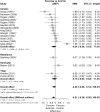Exercise training improves blood pressure reactivity to stress: a systematic review and meta-analysis
- PMID: 37414810
- PMCID: PMC10326007
- DOI: 10.1038/s41598-023-38041-9
Exercise training improves blood pressure reactivity to stress: a systematic review and meta-analysis
Abstract
Blood pressure (BP) reactivity to stress is associated with cardiovascular events and the incidence of hypertension, therefore, tolerance to stressors is important for better management of cardiovascular risks. Exercise training is among the strategies that have been investigated as blunting the peak response to stressors, however, its efficacy is poorly explored. The aim was to explore the effects of exercise training (at least four weeks) on BP responses to stressor tasks in adults. A systematic review was performed in five electronic databases (MEDLINE, LILACS, EMBASE, SPORTDiscus, and PsycInfo). Twenty-three studies and one conference abstract was included in the qualitative analysis, totaling 1121 individuals, and k = 17 and 695 individuals in the meta-analysis. Favorable results (random-effects) for exercise training were found, with attenuated peak responses in systolic (standardized mean difference (SMD) = -0.34 [-0.56; -0.11], representing average reductions of 2.5 ± 3.6 mmHg) and null effects on diastolic BP (SMD = -0.20 [-0.54; 0.14], representing average reductions of 2.0 ± 3.5 mmHg). The analysis removing outliers' studies improved the effects for diastolic (SMD = -0.21 [-0.38; -0.05]) but not systolic BP (SMD = -0.33 [-0.53; -0.13]). In conclusion, exercise training seems to lower stress-related BP reactivity, therefore has the potential to improve patients' ability to better respond to stressful situations.
© 2023. The Author(s).
Conflict of interest statement
The authors declare no competing interests.
Figures






Similar articles
-
A single session of exercise reduces blood pressure reactivity to stress: a systematic review and meta-analysis.Sci Rep. 2022 Jul 12;12(1):11837. doi: 10.1038/s41598-022-15786-3. Sci Rep. 2022. PMID: 35821393 Free PMC article.
-
The impact of sprint interval training versus moderate intensity continuous training on blood pressure and cardiorespiratory health in adults: a systematic review and meta-analysis.PeerJ. 2024 Mar 14;12:e17064. doi: 10.7717/peerj.17064. eCollection 2024. PeerJ. 2024. PMID: 38495758 Free PMC article.
-
Tai Ji Quan as antihypertensive lifestyle therapy: A systematic review and meta-analysis.J Sport Health Sci. 2021 Mar;10(2):211-221. doi: 10.1016/j.jshs.2020.03.007. Epub 2020 May 1. J Sport Health Sci. 2021. PMID: 32360952 Free PMC article.
-
The effect of exercise training on blood pressure in African and Asian populations: A systematic review and meta-analysis of randomized controlled trials.Eur J Prev Cardiol. 2020 Mar;27(5):457-472. doi: 10.1177/2047487319871233. Epub 2019 Aug 26. Eur J Prev Cardiol. 2020. PMID: 31450966
-
Characteristics of Aerobic Exercise as Determinants of Blood Pressure Control in Hypertensive Patients: A Systematic Review and Meta-Analysis.J Korean Acad Nurs. 2020 Dec;50(6):740-756. doi: 10.4040/jkan.20169. J Korean Acad Nurs. 2020. PMID: 33441523
Cited by
-
The role of arousal in maintaining the relationship between insomnia and gastrointestinal conditions.Transl Gastroenterol Hepatol. 2024 Jul 9;9:41. doi: 10.21037/tgh-23-126. eCollection 2024. Transl Gastroenterol Hepatol. 2024. PMID: 39091658 Free PMC article. Review.
-
Progressive iso-inertial resistance exercise promotes more favorable cardiovascular adaptations than traditional resistance exercise in young adults.Am J Physiol Heart Circ Physiol. 2024 Jan 1;326(1):H32-H43. doi: 10.1152/ajpheart.00402.2023. Epub 2023 Oct 27. Am J Physiol Heart Circ Physiol. 2024. PMID: 37889252 Free PMC article. Clinical Trial.
-
Designing, Validation, and Feasibility of Integrated Approach of Heartfulness Meditation and Yoga Protocol (IAHFNM & YP) for Hypertensive Participants.Cardiovasc Ther. 2024 Jul 4;2024:9289232. doi: 10.1155/2024/9289232. eCollection 2024. Cardiovasc Ther. 2024. PMID: 39742029 Free PMC article.
References
-
- Bali, A. & Jaggi, A. S. Clinical experimental stress studies: methods and assessment. Rev. Neurosci.26, 555 (2015). - PubMed

